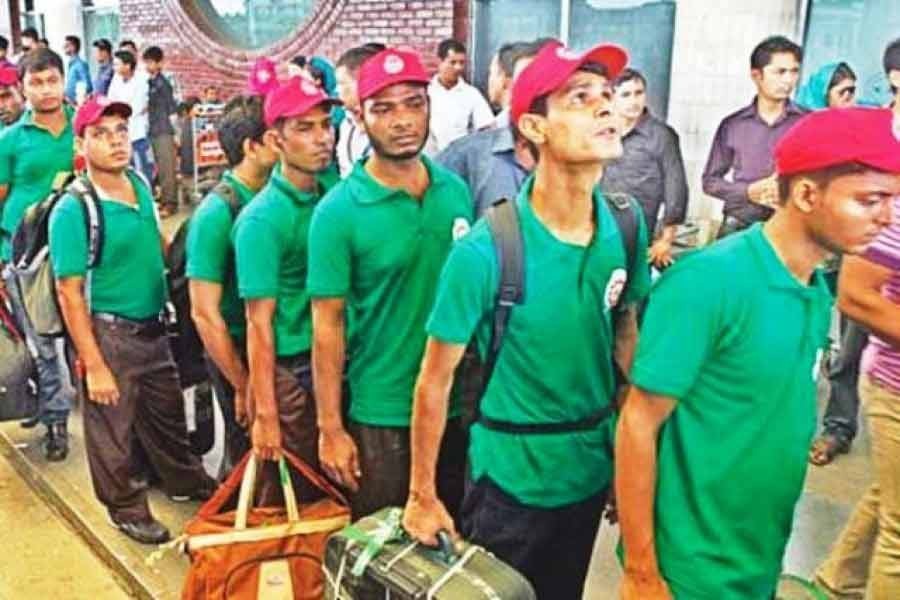
Published :
Updated :

Following the shocking failure of manpower export to Malaysia under government-to-government (G-to-G) arrangement years ago, workers' migration to that country remained stalled. There was uncertainty whether the Malaysian government would reopen its labour market in the near future. This did cause worry for intending job seekers, many of whom had to return home in the wake of the pandemic. The worry is now over; the Malaysian government has nodded to reopen its market to Bangladeshi workers after more than three years' moratorium following alleged wrongdoings under the previous recruitment deal. A MoU has been signed by both governments on Sunday (December 19).
It has been learnt that workers' recruitment is open for a range of sectors, including manufacturing. Besides, what looks like a respite for job seekers is that the Malaysian government has decided to defer implementing various levies from January 01, 2022 to July 01, 2022 in order to ease recruitment of overseas workers.
It may be recalled that years ago a deal was inked between the government of Malaysia and the government of Bangladesh to conduct the migration process of Bangladeshi workers under G-to-G arrangement only-- to free the recruitment process from unfair practices-- allegedly of the private recruiters. What happened to the G-to-G deal is pretty well known. It got stuck. While lack of coordination between the designated agencies of the two governments is blamed for delays and very little forward movement, there are quarters who believe it was due to the opposing stance of the Bangladesh Association of International Recruiting Agencies (BAIRA) that snuffed the move. As the platform of the country's private recruiters, BAIRA was not likely to feel comfortable with the government's move to take away a juicy chunk from of what it considered its own pie. The government's stand at that time looked convincing, as the G-to-G arrangement was presented to the nation as a viable, cost-effective and efficient method of recruiting overseas jobseekers. It augured well in view of the incidents of an increasing number of jobseekers being routinely lured and tricked by private recruiters and more often than not, taken for the most unholy of rides. In fact, it was the government's intent to put a halt to fraud and swindling that drew support from most quarters, although there were doubts as to the competence of government agencies to handle the task. And so it happened. The much drummed up G-to-G did not work, much to the frustration of job seekers.
That the G-to-G scheme had caused a great stir among the job seekers at that time was evident from the fact that as many as 1.4 million people got themselves registered to go to Malaysia on employment through government channels. Of them, 11,538 were selected through lottery to go in the first phase. But the slow and aimless move soon dampened the confidence of the jobseekers in the government channel, and many opted to risk their lives in their desperate bid to make it happen, making themselves easy prey to the horrifying human trafficking.
The latest developments regarding the reopening of the labour market has raised hopes for the overseas jobseekers. Welcoming the Malaysian government's latest decision, local manpower recruiters said it would create an opportunity for many Bangladeshi workers to find jobs there. Over 1.0 million Bangladeshis had gone to Malaysia for jobs since 1978, according to data available with the Bureau of Manpower Employment and Training. They are among around 10 million wage earners abroad, a substantial number of whom had to return home or got furloughed in different countries during the Covid-19 pandemic.
Now, in view of the decision of the Malaysian government to reopen its labour market to Bangladesh, the key issue remains orderly handling of the entire process-- recruitment of workers, sending them to their workplaces and settling all job-related issues as per the guidelines agreed by both governments. Among these, migration cost is indeed the most crucial issue to attend to. It has been reported that in the past, before the moratorium was slapped, migration cost per expatriate worker to Malaysia soared as high as to Tk 400,000--- an irrational and unaffordable sum for job seekers. Reducing the cost, and restricting the private operators from dictating the terms should be the key focus of both governments. It has been learnt from reports that an influential lobby is at work in Bangladesh and Malaysia which wants a limited number of Bangladeshi manpower agents to be involved with the job---an indication that syndication may again emerge as a spoilsport.
The government had tried a number of times in the past to rein in the influence of the private operators, but to no avail. Clearly, it was the failure of the designated state agency to prevail on them. One only hopes things got better this time.


 For all latest news, follow The Financial Express Google News channel.
For all latest news, follow The Financial Express Google News channel.